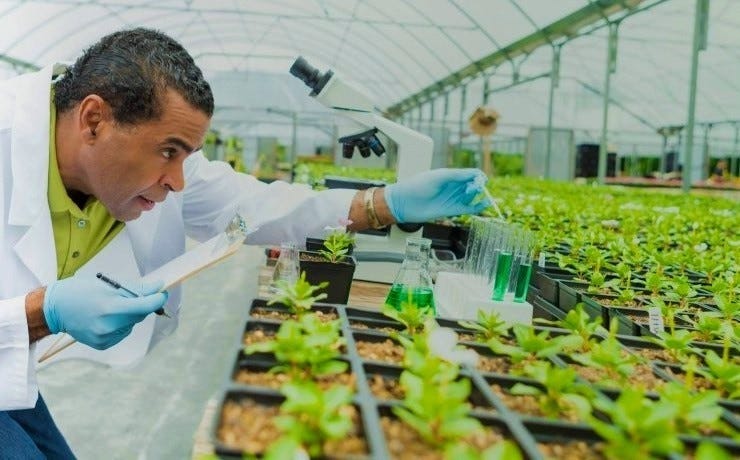- In the face of growing global challenges such as climate change, population growth, and diminishing natural resources, the need for sustainable agricultural practices has never been more pressing.
In the face of growing global challenges such as climate change, population growth, and diminishing natural resources, the need for sustainable agricultural practices has never been more pressing.
Biotechnology, with its potential to revolutionize crop production and address key agricultural issues, has emerged as a promising tool in the pursuit of sustainability.
However, along with its promises, biotechnology also raises significant concerns regarding its impact on human health, the environment, and socio-economic factors.
Understanding the role of biotechnology in sustainable agriculture requires a nuanced examination of both its potential benefits and associated risks.
Promises of Biotechnology in Agriculture
Read More
Biotechnology offers a range of innovative solutions that can contribute to sustainable agriculture in several ways:
Increased Crop Yields
Biotechnological tools such as genetically modified organisms (GMOs) can enhance crop yields by introducing traits such as resistance to pests, diseases, and environmental stressors.
This can help improve food security and alleviate hunger in regions facing agricultural challenges.
Reduced Environmental Impact
Biotechnology has the potential to reduce the environmental footprint of agriculture by decreasing the need for chemical pesticides and fertilizers.
For example, crops engineered for pest resistance can require fewer chemical inputs, leading to reduced pesticide use and lower environmental contamination.
Improved Nutritional Quality
Biotechnology can be used to enhance the nutritional content of crops, thereby addressing malnutrition and dietary deficiencies.
For instance, bio-fortified crops enriched with vitamins and minerals can help improve public health outcomes, particularly in developing countries.
Enhanced Adaptation to Climate Change
Biotechnology can help develop crops that are more resilient to the effects of climate change, such as drought, heat, and salinity.
By breeding plants with enhanced tolerance to environmental stressors, biotechnology can contribute to the sustainability and resilience of agricultural systems.
Concerns Surrounding Biotechnology
Despite its potential benefits, biotechnology in agriculture is not without its share of concerns:
Environmental Risks
The widespread cultivation of genetically modified crops may pose environmental risks such as unintended gene flow to wild relatives, the emergence of resistant pests and weeds, and disruption of natural ecosystems.
Critics argue that the long-term environmental consequences of biotechnology in agriculture are not fully understood and warrant caution.
Health Impacts
There are concerns about the potential health impacts of genetically modified crops on human consumers.
While regulatory bodies generally consider GMOs safe for consumption, some studies suggest potential allergenicity or toxicity risks associated with genetically modified foods, necessitating further research and monitoring.
Socio-Economic Considerations
Biotechnology in agriculture can have socio-economic implications, particularly for small-scale farmers in developing countries.
The high costs associated with patented biotechnologies, such as genetically modified seeds, may exacerbate inequalities and dependency on multinational corporations, raising concerns about food sovereignty and farmers' rights.
Ethical and Moral Dilemmas
Biotechnology raises ethical and moral dilemmas related to the manipulation of living organisms and the commodification of life.
Debates surrounding issues such as genetic engineering, cloning, and gene editing raise questions about the appropriate boundaries of human intervention in nature and the implications for future generations.
Navigating the Path Forward
Addressing the promises and concerns surrounding biotechnology in agriculture requires a balanced approach that considers scientific evidence, regulatory frameworks, and stakeholder perspectives. Key considerations include:
Risk Assessment and Regulation
Rigorous risk assessment and regulation are essential to ensure the safety of biotechnological products for human health and the environment.
Regulatory frameworks should be transparent, science-based, and responsive to emerging technologies.
Transparency and Public Engagement
Open dialogue and public engagement are crucial for building trust and consensus around biotechnology in agriculture. Stakeholder involvement, including farmers, consumers, scientists, and policymakers, can help address concerns, foster accountability, and promote responsible innovation.
Diversification of Approaches
Sustainable agriculture requires a holistic approach that integrates diverse strategies, including agro ecology, organic farming, and precision agriculture, alongside biotechnology.
Emphasizing biodiversity, soil health, and ecological resilience can enhance the sustainability of agricultural systems while minimizing reliance on external inputs.
Ethical Considerations
Ethical considerations should guide the development and deployment of biotechnological solutions in agriculture, ensuring respect for human dignity, animal welfare, and environmental integrity.
Principles such as precaution, equity, and justice should inform decision-making processes and guide the ethical governance of biotechnology.












